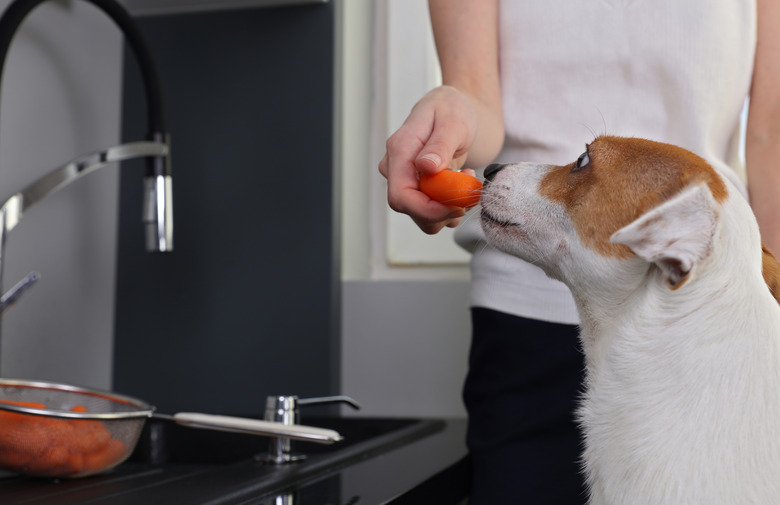Vegetables That Are Safe For Dogs
Many dogs will happily munch veggies as treats or as part of their daily diet. Because they come packed with vitamins, minerals, and plenty of fiber, incorporating vegetables into your pooch's diet can help promote his good health and nutrition. Most vegetables that are safe for people are safe for your dog to enjoy, too. However, some veggies that provide your pup with nutritional or health benefits are best consumed in small amounts, while others should be avoided entirely.
Roots, tubers, and stalks
Roots, tubers, and stalks
Cooked sweet potatoes and yams are safe for your pup to eat, as well as white potatoes, but you may want to limit the quantity as they are high in starch. Roots like beets and turnips are also fine for dogs to eat.
Yucca, according to Cesar's Way, provides relief from canine digestive problems and holds anti-inflammatory properties. Carrots are safe and are rich in vitamins and minerals. As for stalks, asparagus is safe for pooches to munch and provides vitamin K and B vitamins. Celery is fine for dogs and provides an excellent source of iron, calcium, sodium, potassium, and phosphorus.
Because your pup's teeth aren't designed to grind hard, crunchy vegetables such as raw tubers and stalks, they should be chopped into small pieces, and ground or steamed to a soft consistency for easier consumption and better digestion.
Cabbages and lettuce for dogs
Cabbages and lettuce for dogs
Cabbages and inflorescent vegetables, including Brussels sprouts, cauliflower, and broccoli are not only safe to feed your dog, they are chock-full of fiber and nutrients, including vitamins K and C. Salad greens like romaine lettuce and arugula can be fed to your pup, as can spinach, kale, and collard greens.
Dogs can eat iceberg lettuce, but feeding it to your pup won't provide him with any of the nutrients he needs. Greens will be most easily consumed after being chopped and cooked — steaming is best for maximum nutrient retention.
Beans, pods, and fruit vegetables
Beans, pods, and fruit vegetables
Green beans provide your pooch with vitamins and fiber, and peas — snap, snow, sugar, and English — are good for her, too. Edamame is safe for dogs and is a good source of protein. Some fruit vegetables like tomato (not the plant or green tomatoes — those are toxic), cucumber, zucchini, and bell peppers are safe for dogs to ingest, but avocado should be avoided, as it is considered poisonous to canines.
The gourds you eat are usually safe for your pooch, including acorn, butterfly, and buttercup squash. Pumpkin is loaded with fiber and beta-carotene and can help your pup overcome some digestive maladies, but because pumpkin is very high in vitamin A — which is highly toxic in excess — this harvest-season favorite should be fed in small amounts.
Veggies to avoid
Veggies to avoid
Not every plant that is safe for human consumption is safe for canines and there are many foods dogs can't eat. Onions, shallots, scallions, and garlic, for example, can be poisonous to dogs, according to the American Society for the Prevention of Cruelty to Animals, with the stronger-scented/flavored garlic the most toxic of the bunch.
While dogs usually won't gobble up enough raw garlic or onion to cause serious malady, the ASPCA says that if they are used to add flavor to a soup or stew, your pooch may be inclined to eat more of it than he would if it were raw.
If consumed in a great enough quantity, plants from the onion family can damage your pup's red blood cells. Rhubarb should be avoided, as it can cause renal failure. Not all mushrooms are toxic to dogs, but it is best to avoid feeding them to your dog, according to Pet Poison Hotline.
Always check with your veterinarian before changing your pet's diet, medication, or physical activity routines. This information is not a substitute for a vet's opinion.
References
- American Society for the Prevention of Cruelty to Animals: Tomato Plant
- American Society for the Prevention of Cruelty to Animals: Toxic and Non-Toxic Plant List –- Dogs
- American Society for the Prevention of Cruelty to Animals: Foods That Are Hazardous to Dogs
- Cesar's Way: Dog Nutrition: A to Z
- Vet Info: Ingredients for Homemade, Healthy Dog Food
- The Cooks Thesaurus: Vegetables Category
- American Society for the Prevention of Cruelty to Animals: Rhubarb
- Pet Poison Helpline: Poisons
- American Society for the Prevention of Cruelty to Animals: Acorn Squash
